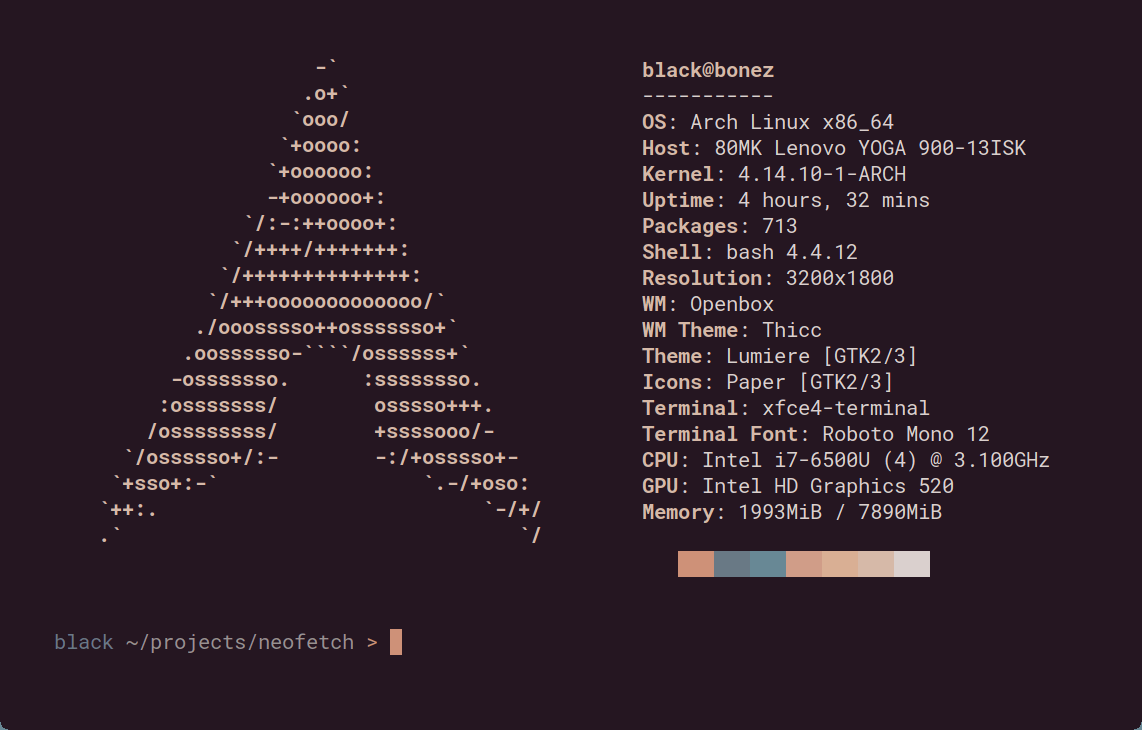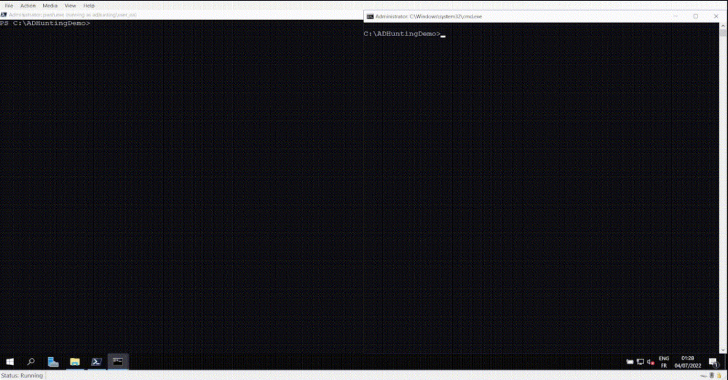Neofetch is a command-line system information tool written in bash 3.2+. Neofetch displays information about your operating system, software and hardware in an aesthetic and visually pleasing way.
The overall purpose of Neofetch is to be used in screen-shots of your system. Neofetch shows the information other people want to see. There are other tools available for proper system statistic/diagnostics.

The information by default is displayed alongside your operating system’s logo. You can further configure Neofetch to instead use an image, a custom ASCII file, your wallpaper or nothing at all.
You can further configure Neofetch to display exactly what you want it to. Through the use of command-line flags and the configuration file you can change existing information outputs or add your own custom ones.
Neofetch supports almost 150 different operating systems. From Linux to Windows, all the way to more obscure operating systems like Minix, AIX and Haiku. If your favourite operating system is unsupported: Open up an issue and support will be added.
Also ReadMail Security Testing – Framework For Mail Security & Filtering Solutions
Neofetch Installation
Latest Release
- Download the latest release.
- Run
make installinside the script directory to install the script.- El Capitan:
make PREFIX=/usr/local install - Haiku:
make PREFIX=/boot/home/config/non-packaged install - OpenIndiana:
gmake install - MinGW/MSys:
make -i install - NOTE: You may have to run this as root.
- El Capitan:
Latest Git Master (Bleeding Edge)
- Git clone the repo.
git clone https://github.com/dylanaraps/neofetch
- Change working directory to
neofetch.cd neofetch
- Install neofetch using the Makefile.
make install- El Capitan:
make PREFIX=/usr/local install - Haiku:
make PREFIX=/boot/home/config/non-packaged install - OpenIndiana:
gmake install - MinGW/MSys:
make -i install - NOTE: You may have to run this as root.
NOTE: Neofetch can be uninstalled easily using make uninstall. This removes all of files from your system.
NOTE: You can run neofetch from any folder on your system, all the makefile does is move the files to a “sane” location. The Makefile is optional.
OS/Distro Packages
This section lists neofetch packages that have been made for specific OS/Distros.
Alpine Linux
Alpine Linux v3.8 and up
- Update repositories
apk update
- Install the package
apk add neofetch
Android (Termux)
Neofetch is in Termux’s default repos.
- Update repositories
sudo apt-get update
- Install the package
sudo apt-get install neofetch
Arch
Neofetch is available in the official repos.
- Install the package
pacman -S neofetch
BunsenLabs
Neofetch is available in the official repos.
- Update repositories
sudo apt-get update
- Install the package
sudo apt-get install neofetch
CRUX
- Install git and the git ports(8) driver
sudo prt-get depinst git
- Add the
6c36-gitrepositorysudo wget -O /etc/ports/6c37-git.git "https://raw.githubusercontent.com/6c37/cross/master/git-driver/6c37-git.git"
- Sync the repos
sudo ports -u
- Add the repo to /etc/prt-get.conf with your text editor of choice
prtdir /usr/ports/6c37-git
- Install the package
sudo prt-get depinst neofetch
Or alternatively use the port:
- Download port
wget -O ~/work/neofetch/Pkgfile "https://raw.githubusercontent.com/6c37/crux-ports-git/3.2/neofetch/Pkgfile"
- Build the package
fakeroot pkgmk -d
- Install the package
sudo pkgadd neofetch#git-*.pkg.tar.gz
Debian
Stretch / Sid (Unstable)
Neofetch is in Debian Stretch/Sid’s official repositories.
- Update repositories
sudo apt-get update
- Install the package
sudo apt-get install neofetch
NOTE: Debian stretch repo only contains version 2.0.2.
NOTE2: The third party bintray repo has been deprecated, if you want to stay up to date with neofetch on Debian stable, then you need to manually install newer packages from unstable or download neofetch directly from git repository since it’s contained in single file.
Fedora / RHEL / CentOS / Mageia
NOTE: If you are using RHEL/CentOS, change dnf into yum.
- Make sure you have installed
dnf-plugins-core - Enable COPR repository
sudo dnf copr enable konimex/neofetch
- Install the package
sudo dnf install neofetch
Alternatively:
- If you’re using RHEL/CentOS, make sure you have installed
epel-release - Fetch the repo file
curl -o /etc/yum.repos.d/konimex-neofetch-epel-7.repo
https://copr.fedorainfracloud.org/coprs/konimex/neofetch/repo/epel-7/konimex-neofetch-epel-7.repo- NOTE: If you are using Fedora, change
epel-7tofedora-23or your Fedora version respectively. However if you are using RHEL/CentOS 6, change it toepel-6.
- NOTE: If you are using Fedora, change
- Install the package
sudo dnf install neofetch
Gentoo / Funtoo
You can install app-misc/neofetch from Gentoo/Funtoo’s official repositories.
To install the git version of neofetch, use =app-misc/neofetch-9999 instead.
GoboLinux
Install it with the official recipe.
sudo Compile neofetch
iOS
- Add
http://dylanaraps.com/repoto your cydia sources. - Install
neofetchthrough cydia.
macOS (Homebrew)
- Install
neofetchwith Homebrewbrew install neofetch
NixOS
Install it from the official repositories
sudo nix-env -i neofetch
Slackware
Download the files from SlackBuilds and follow their instructions.
Solus
You can find neofetch in software center under System Software > System Utilities or type sudo eopkg it neofetch.
Ubuntu
Ubuntu 17.04 and up
Install it from the official repositories.
- Update repositories
sudo apt update
- Install the package
sudo apt install neofetch
Ubuntu 16.10 and below
- Add PPA
sudo add-apt-repository ppa:dawidd0811/neofetch
- Update repositories
sudo apt update
- Install the package
sudo apt install neofetch
Ubuntu daily builds
This PPA contains daily builds of neofetch straight from master branch
- Add PPA
sudo add-apt-repository ppa:dawidd0811/neofetch-daily
- Update repositories
sudo apt update
- Install the package
sudo apt install neofetch
Void Linux
Install it from the official repositories
sudo xbps-install -S neofetch















